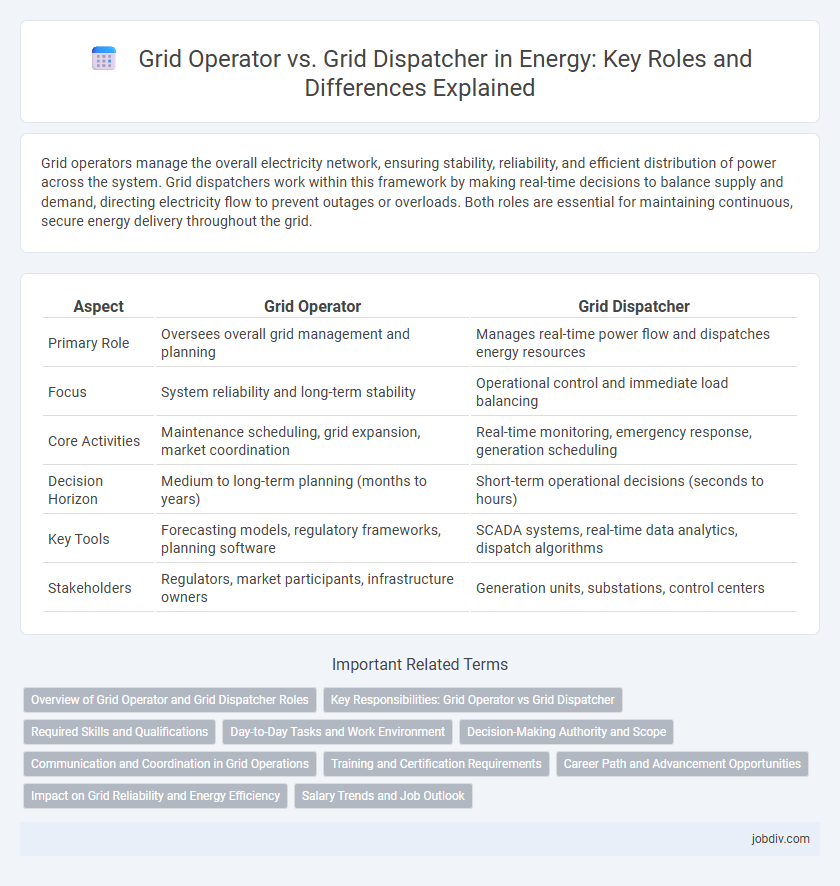Grid operators manage the overall electricity network, ensuring stability, reliability, and efficient distribution of power across the system. Grid dispatchers work within this framework by making real-time decisions to balance supply and demand, directing electricity flow to prevent outages or overloads. Both roles are essential for maintaining continuous, secure energy delivery throughout the grid.
Table of Comparison
| Aspect | Grid Operator | Grid Dispatcher |
|---|---|---|
| Primary Role | Oversees overall grid management and planning | Manages real-time power flow and dispatches energy resources |
| Focus | System reliability and long-term stability | Operational control and immediate load balancing |
| Core Activities | Maintenance scheduling, grid expansion, market coordination | Real-time monitoring, emergency response, generation scheduling |
| Decision Horizon | Medium to long-term planning (months to years) | Short-term operational decisions (seconds to hours) |
| Key Tools | Forecasting models, regulatory frameworks, planning software | SCADA systems, real-time data analytics, dispatch algorithms |
| Stakeholders | Regulators, market participants, infrastructure owners | Generation units, substations, control centers |
Overview of Grid Operator and Grid Dispatcher Roles
Grid Operators oversee the overall management and coordination of electricity transmission networks, ensuring grid reliability and balancing supply and demand across regions. Grid Dispatchers execute real-time control by directing power flows, managing outages, and responding to system disturbances to maintain grid stability. Both roles are essential for efficient energy distribution and preventing blackouts in modern power systems.
Key Responsibilities: Grid Operator vs Grid Dispatcher
Grid Operators oversee the real-time management of electrical power flow across the transmission network, ensuring system reliability and balancing demand with supply. Grid Dispatchers execute operational instructions, coordinate grid resources, and respond to disturbances to maintain grid stability. Both roles are critical for continuous power delivery but differ in scope, with Operators focusing on strategic control and Dispatchers on tactical execution.
Required Skills and Qualifications
Grid Operators require strong analytical skills, proficiency in energy management systems, and a deep understanding of electrical grid infrastructure to monitor and control power flow effectively. Grid Dispatchers need excellent decision-making abilities, real-time communication skills, and the capacity to coordinate with field technicians and emergency response teams to ensure grid stability. Both roles demand certifications in power system operations and experience with SCADA (Supervisory Control and Data Acquisition) systems for efficient grid management.
Day-to-Day Tasks and Work Environment
Grid operators monitor and control the electrical grid to ensure stability, balancing supply and demand in real-time using advanced SCADA systems. Grid dispatchers execute operational orders, coordinate maintenance schedules, and respond promptly to outages within control centers, often under high-pressure conditions. Both roles demand strong decision-making skills and deep knowledge of grid infrastructure, but operators focus on continuous oversight while dispatchers manage immediate actions and communication.
Decision-Making Authority and Scope
Grid Operators possess overarching decision-making authority for the management and coordination of the entire power grid, ensuring system stability and reliability across multiple regions. Grid Dispatchers handle real-time operational decisions, directing the flow of electricity and managing immediate responses to outages or demand fluctuations within localized areas. The distinction lies in the Grid Operator's strategic control and regulatory compliance versus the Grid Dispatcher's tactical execution and rapid incident management.
Communication and Coordination in Grid Operations
Grid operators oversee the real-time monitoring and control of electrical networks to ensure system stability and efficient power flow. Grid dispatchers communicate continuously with field crews, generation plants, and substations to coordinate responses to demand fluctuations, faults, or emergencies. Effective communication protocols and advanced SCADA systems are critical for seamless coordination between operators and dispatchers, minimizing downtime and optimizing energy distribution.
Training and Certification Requirements
Grid operators must complete extensive training programs and obtain certifications such as the NERC System Operator Certification to comply with North American electric reliability standards. Grid dispatchers undergo specialized training focusing on real-time system monitoring, load balancing, and emergency response, often requiring certification through regional or national regulatory bodies. Both roles demand ongoing education to maintain proficiency in evolving grid technologies and operational protocols.
Career Path and Advancement Opportunities
Grid operators manage the overall functionality and stability of electrical grids, coordinating complex systems and ensuring reliable power distribution, which often requires advanced certifications and extensive technical knowledge. Grid dispatchers focus on real-time decision-making to balance supply and demand, offering opportunities to specialize in operational control with potential growth into supervisory roles. Career advancement for grid operators typically leads to senior management or engineering positions, while dispatchers may progress toward control center leadership or transition into grid operations for broader responsibilities.
Impact on Grid Reliability and Energy Efficiency
Grid Operators oversee the overall management and coordination of electricity flow, ensuring optimal balance between supply and demand to maintain grid reliability. Grid Dispatchers execute real-time control commands, rapidly responding to supply fluctuations and emergencies to prevent outages and enhance energy efficiency. Effective collaboration between operators and dispatchers minimizes disruptions and optimizes resource utilization across the electrical grid.
Salary Trends and Job Outlook
Grid Operators typically earn a median salary ranging from $70,000 to $90,000 annually, reflecting increased demand for skilled professionals managing electrical grid stability. In contrast, Grid Dispatchers' salaries often range between $60,000 and $80,000, influenced by regional energy infrastructure and operational complexity. Job outlook for both roles remains strong, driven by expanding renewable energy integration and modernization of power systems requiring enhanced coordination and real-time grid management.
Grid Operator vs Grid Dispatcher Infographic

 jobdiv.com
jobdiv.com